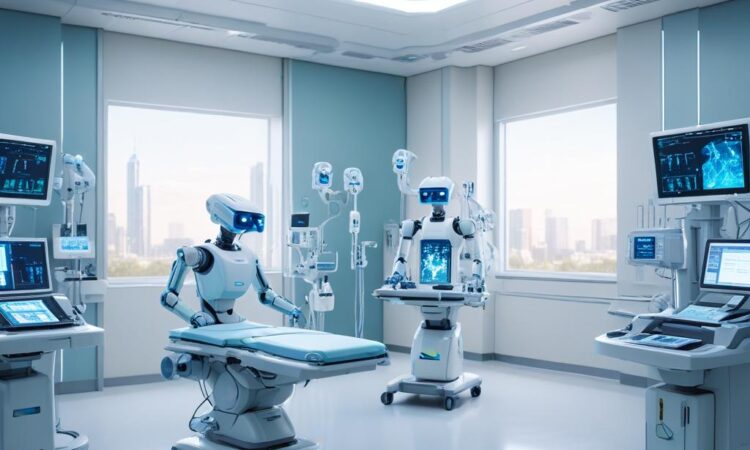Artificial Intelligence (AI) in Healthcare: Revolutionizing Patient Care
The rapid adoption of AI in healthcare continues to dominate headlines. Recent developments include new AI-powered diagnostics for early disease detection, AI-assisted drug discovery, and personalized medicine platforms. This trend is fueled by increasing investments and a growing focus on improving patient outcomes and healthcare efficiency.
The Transformative Power of AI in Healthcare
AI is poised to revolutionize healthcare in multiple ways, offering solutions to long-standing challenges and creating new opportunities for improved patient care:
1. Enhanced Diagnostics and Early Disease Detection
AI algorithms can analyze vast amounts of medical data, including patient history, medical images, and genetic information, to identify patterns and anomalies that may indicate early signs of disease. This allows for faster and more accurate diagnosis, leading to timely interventions and improved patient outcomes.
Examples:
- AI-powered imaging analysis can detect subtle abnormalities in mammograms, potentially identifying breast cancer at earlier stages.
- AI algorithms can analyze electrocardiogram (ECG) data to identify high-risk individuals for heart disease.
- AI-powered dermatology tools can assist in the diagnosis of skin conditions like melanoma.
2. AI-Assisted Drug Discovery and Development
AI is accelerating drug discovery by analyzing vast datasets of chemical compounds, identifying potential drug candidates, and predicting their effectiveness and safety. This process can significantly shorten the time and cost associated with traditional drug development, bringing life-saving treatments to patients faster.
Examples:
- AI algorithms can analyze existing drugs to repurpose them for new indications.
- AI can assist in identifying promising drug targets for specific diseases.
- AI-powered drug discovery platforms can accelerate clinical trial design and recruitment.
3. Personalized Medicine and Precision Healthcare
AI enables the development of personalized medicine approaches that tailor treatment plans to individual patients based on their unique genetic makeup, lifestyle, and medical history. This precision healthcare approach aims to optimize treatment effectiveness, reduce side effects, and improve patient outcomes.
Examples:
- AI algorithms can predict a patient’s response to specific medications, allowing for personalized treatment plans.
- AI-powered platforms can monitor patients’ health remotely and provide personalized recommendations for lifestyle changes.
- AI can assist in identifying genetic predispositions to certain diseases, enabling early intervention and preventive measures.
4. Automation of Repetitive Tasks and Administrative Processes
AI can automate many administrative tasks, freeing up healthcare professionals to focus on patient care. This includes tasks such as scheduling appointments, processing insurance claims, and managing patient records.
Examples:
- AI-powered chatbots can provide patients with basic medical information and answer common questions.
- AI algorithms can automate the analysis of medical images, reducing the workload of radiologists.
- AI can assist in the development of personalized treatment plans by analyzing patient data and clinical guidelines.
Benefits of AI in Healthcare
The adoption of AI in healthcare offers numerous benefits:
- Improved Patient Outcomes: AI-powered diagnostics and personalized treatment plans lead to earlier detection and more effective management of diseases, resulting in improved health outcomes.
- Increased Efficiency and Productivity: Automation of administrative tasks allows healthcare professionals to focus on providing high-quality patient care, leading to increased efficiency and productivity.
- Reduced Costs: AI can help reduce healthcare costs by streamlining processes, improving efficiency, and reducing unnecessary tests and procedures.
- Enhanced Access to Healthcare: AI-powered tools can provide remote access to healthcare services, expanding access to underserved populations.
- Improved Patient Experience: AI-powered systems can provide patients with personalized care, information, and support, leading to a more positive patient experience.
Challenges and Ethical Considerations
Despite its potential, the adoption of AI in healthcare also presents challenges and ethical considerations:
- Data Privacy and Security: AI relies heavily on vast amounts of patient data, raising concerns about privacy and security. Ensuring responsible data management and strict adherence to privacy regulations is paramount.
- Bias and Fairness: AI algorithms can reflect biases present in the data they are trained on, leading to potentially unfair or discriminatory outcomes. Addressing bias in AI models is crucial for ensuring equitable healthcare access.
- Transparency and Explainability: AI algorithms can be complex and difficult to understand, raising concerns about transparency and accountability. Developing explainable AI models that provide insights into decision-making processes is essential.
- Human-Machine Collaboration: Integrating AI into healthcare requires careful consideration of how human healthcare professionals will interact with AI systems. Establishing clear roles and responsibilities is essential for effective collaboration.
The Future of AI in Healthcare
AI is rapidly transforming the healthcare landscape, and its impact is expected to continue growing in the years to come. Future developments in AI are likely to include:
- Advancements in Natural Language Processing (NLP): AI-powered chatbots and virtual assistants will become more sophisticated, providing patients with more personalized and comprehensive support.
- Growth of Wearable Sensors and Remote Monitoring: AI will play a crucial role in analyzing data from wearable sensors and remote monitoring devices, enabling proactive health management and early intervention.
- Development of AI-Powered Surgical Robots: AI will enhance the capabilities of robotic surgical systems, leading to more precise and minimally invasive procedures.
- Integration of AI into Clinical Decision Support Systems: AI will provide healthcare professionals with real-time insights and recommendations, improving clinical decision-making and patient care.
The integration of AI in healthcare holds immense promise for improving patient outcomes, enhancing healthcare efficiency, and transforming the delivery of healthcare services. As AI technologies continue to evolve, it is essential to address ethical concerns and ensure responsible adoption to maximize its benefits while mitigating potential risks.

